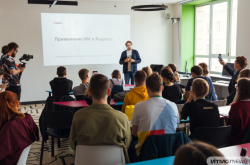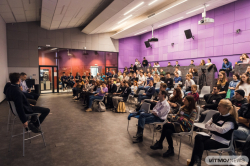The course’s main focus was industrial software development. Having completed the theoretical part of the course on highload systems, the participants could choose one of two tracks to narrow down on: DevOps or information security. These specializations were dictated by the contemporary approach to software development, says associate professor at ITMO’s Information Systems and Programming Faculty Alexander Mayatin:
“Earlier, it was believed that software development is mainly programming, and that is what makes the core of educational programs at many universities. Currently, software development is seen wider. It’s important to create not only functional but also efficient systems that are reliable and safe for financial transactions and personal data storage. All of these requirements contradict each other: for instance, by increasing a system’s reliability, we will lose out on response time or recovery time after a failure. Thus, the developers are forced to look for compromises and create unique engineering solutions for each task, using modern tech tools. In order to do this successfully, it’s not enough to just code: you also need to know the development, deployment, and support technologies for highload systems, as well as various aspects of cybersecurity.”

Alexander Mayatin. Photo by ITMO University
To participate in the student camp, applicants had to pass a test and an interview. The final stage involved 94 Bachelor's IT students from 23 cities across Russia. In the first week of training, participants learned the architecture of highload systems, development processes, and IT infrastructure management. Classes also covered the basics of computer networks and operating systems, and the application of the Agile methodology in design; students also received career advice on growing from junior to senior. In the second week, participants chose a specialization: DevOps or information security. Students who chose the first track immersed themselves in the work of a DevOps engineer: they mastered the skills of administering Linux and Windows servers, as well as created and configured virtual containers and pipelines for software deployment. And in the second track, they got acquainted with the profession of an information security specialist through studying the security of artificial intelligence systems, applied cryptography, reverse engineering, code analysis, and vulnerability research.
At the end of the course, participants defended their team projects. Among the information security cases were a model for assessing password complexity, a program that can distinguish a neural network-generated image from a real one with an accuracy of 80%, and an application that automatically analyzes user behavior on social media and messengers based on their online status. The DevOps specialization participants came up with projects on the development of monitoring and telemetry systems, presented tools for deploying the Keycloak system, and proposed a methodology for managing applications in Kubernetes using the Helm Charts package manager.
Each project was evaluated by ITMO and Yandex experts. According to project mentors, in just a week students were able to acquire a good command of the new technologies and use them to develop quality solutions. At ITMO Family Day, the university’s open-air festival, the participants received their course completion certificates, with the most successful students being invited for internships at Yandex.
“This intensive course is about opportunities. We do our best to create an environment where students can not only gain valuable experience and knowledge, but also explore the IT field, learning the inner working processes of IT companies and various ways to start their careers. Moreover, the course also offers its participants a chance to show their prowess. For example, a participant who showed his skill in two courses that we held at different universities is now at his final stage of the interview before his internship – and there are more and more of such cases. But most importantly, the course is an opportunity to find your community, the people you’d want to grow together with,” shared Alyona Rymshina, a curator of intensive educational programs at Yandex Education and the head of the course on software development.

Credit: ITMO Mediaportal
Maxim Vayda, a second-year Bachelor’s student at Immanuel Kant Baltic Federal University, also noted the course’s focus on practical tasks. His team worked with the Keycloak system that uses single sign-on technology that allows users to access their personal pages on different websites with, for example, their Yandex account instead of an ID. However, if something were to happen to Keycloak, users won’t be able to access their personal pages. As a solution, Maxim Vayda’s team developed digital copies of Keycloak. If some of them go down, the app will remain operational, allowing users to log in.
“I enjoyed being a part of the IT crowd at the course. In a short period of time, we familiarized ourselves with the Kubernetes platform, as well as Terraform and Keycloak – the tech that I wouldn’t likely learn on my own. Our lecturers were IT professionals who offered real-life hands-on knowledge. For instance, I used to think lab assignments were far from reality in the industry, so I was amazed that ITMO faculty created them in such a way that helped us gain skills we could use in a real-world project. All in all, I really liked ITMO: here, you can spend your days coding at coworking spaces and your lecturers are ready to help you with anything you don’t understand. It was an experience to remember and now I may consider ITMO for my Master’s studies,” said Maxim Vayda.

Maxim Vayda. Photo by ITMO.NEWS
This course by ITMO and Yandex Education was held on June 24 - July 6 and became one of the four free educational intensive courses in IT by Yandex. In 2024, the tech giant collaborated with Russia’s leading universities for these intensive courses, including ITMO, Higher School of Economics, Innopolis, and Ural Federal University.





